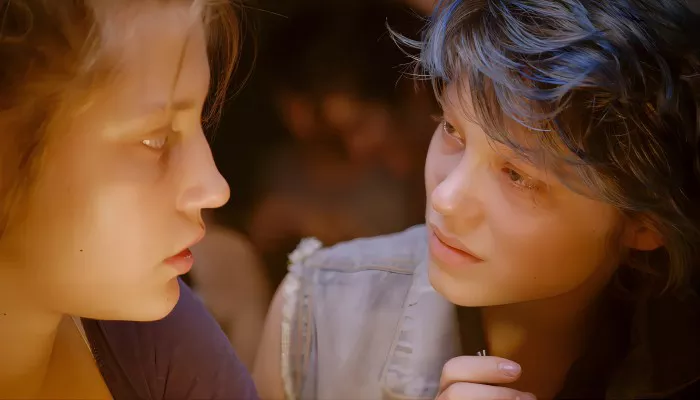Outline of Blue Is the Warmest Colour
“Blue Is the Warmest Colour” is a French romantic coming-of-age drama film directed by Abdellatif Kechiche, based on the graphic novel of the same name by Julie Maroh. Released in 2013, the film garnered widespread acclaim for its raw and intimate portrayal of a young woman’s journey of self-discovery and sexual awakening.
The story follows Adèle, a high school student played by Adèle Exarchopoulos, who experiences a profound and tumultuous relationship with Emma, an older art student portrayed by Léa Seydoux. As their passionate romance unfolds, the film delves into themes of love, identity, and desire, capturing the complexities of human relationships with remarkable depth and sensitivity.
“Blue Is the Warmest Colour” premiered at the Cannes Film Festival in 2013, where it received the prestigious Palme d’Or, the highest prize awarded at the festival. The film’s three-hour runtime and explicit scenes generated considerable attention and controversy, but critics and audiences alike praised its powerful performances, nuanced storytelling, and emotional resonance.
Beyond its critical success, “Blue Is the Warmest Colour” sparked important conversations about representation, sexuality, and the female gaze in cinema. It remains a landmark film in contemporary French cinema and a poignant exploration of love and longing that continues to resonate with audiences worldwide.
Director – Abdellatif Kechiche
Abdellatif Kechiche is a Tunisian-French filmmaker celebrated for his bold and immersive approach to storytelling, often exploring themes of identity, love, and social dynamics. Born on December 7, 1960, in Tunis, Tunisia, Kechiche immigrated to France at a young age and later pursued a career in cinema.
Kechiche gained international recognition with his directorial debut, “La Faute à Voltaire” (Blame It on Voltaire), released in 2000. However, it was his subsequent films that solidified his reputation as a formidable filmmaker. His breakthrough came with “L’Esquive” (Games of Love and Chance) in 2003, which won the César Award for Best Film and earned critical acclaim for its authentic portrayal of French youth culture.
In 2007, Kechiche further cemented his status with “La Graine et le Mulet” (The Secret of the Grain), a poignant drama exploring themes of immigration and family dynamics, which earned him widespread praise and numerous awards, including the prestigious Louis Delluc Prize and the César Award for Best Film.
However, Kechiche reached unprecedented heights with “La Vie d’Adèle” (Blue Is the Warmest Colour) in 2013. Adapted from Julie Maroh’s graphic novel, the film captivated audiences and critics alike with its raw and intimate portrayal of a young woman’s journey of self-discovery and sexual awakening. “Blue Is the Warmest Colour” earned Kechiche the Palme d’Or at the Cannes Film Festival, solidifying his place as one of the most influential directors of contemporary French cinema.
Despite controversy surrounding his filmmaking methods and on-set dynamics, Kechiche’s work continues to be celebrated for its emotional depth, visual richness, and profound exploration of human experiences. With each project, he pushes the boundaries of cinema, challenging audiences to confront complex and often uncomfortable truths about society and the human condition.
Behind-the-scenes Story
“Blue Is the Warmest Colour” is a 2013 French romantic drama film directed by Abdellatif Kechiche, based on the graphic novel of the same name by Julie Maroh. The film gained widespread acclaim for its raw portrayal of a young woman’s journey of self-discovery and sexual awakening. Behind the scenes, the production of “Blue Is the Warmest Colour” was marked by both artistic collaboration and controversy.
1. Casting: The film starred Léa Seydoux as Emma and Adèle Exarchopoulos as Adèle, the two central characters whose passionate love affair forms the heart of the story. Both actresses underwent an extensive casting process, with Kechiche ultimately selecting them for their chemistry and ability to embody the complex emotions of their characters.
2. Intensive Filming: Kechiche is known for his meticulous approach to filmmaking, and “Blue Is the Warmest Colour” was no exception. The production was characterized by long and emotionally demanding shooting days, with Kechiche often opting for extended takes to capture the authenticity of the performances.
3. Controversy: Despite the critical acclaim the film received, controversy arose surrounding Kechiche’s directing methods and the treatment of the cast and crew during production. Both Seydoux and Exarchopoulos later spoke out about the challenges they faced on set, including the demanding nature of the filming process and the intensity of certain scenes.
4. Creative Collaboration: Despite the challenges, “Blue Is the Warmest Colour” is also a testament to the collaborative efforts of the cast and crew. Kechiche worked closely with Seydoux and Exarchopoulos to develop their characters, allowing for improvisation and spontaneity in their performances. The result was a film that felt intimate and emotionally resonant, drawing audiences into the characters’ world.
5. Cannes Recognition: The film premiered at the 2013 Cannes Film Festival, where it won the prestigious Palme d’Or, the highest prize awarded at the festival. The award marked a significant achievement for Kechiche and the cast, cementing “Blue Is the Warmest Colour” as a landmark film in French cinema.
Overall, “Blue Is the Warmest Colour” stands as a powerful and provocative exploration of love, desire, and identity, showcasing Kechiche’s distinctive filmmaking style and the talents of its lead actresses. Despite the controversies surrounding its production, the film remains a standout work that continues to resonate with audiences around the world.
https://www.rnada.com/archives/12103
https://www.rnada.com/archives/12164
https://www.rnada.com/archives/12007

